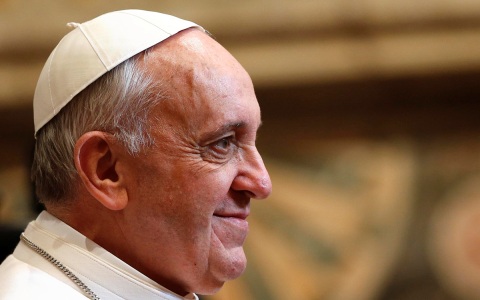ANALYSIS: Thumbs up from the international press for Pope Francis
by - 1st May 2013
 The Roman Catholic Church is on unfamiliar ground.
The Roman Catholic Church is on unfamiliar ground.
For years, the 2000-year-old institution has been well-acquainted with bad press and public relations disasters.
Negative coverage of clerical sex abuse cover-ups, corruption and alleged infighting at the Vatican has dominated coverage of Roman Catholicism in recent times.
And February’s shock resignation of Pope Benedict did little to improve the image of a beleaguered Church struggling to recover its integrity and moral authority.
Then, a month ago, the media tide turned as the smoke wafted from the Sistine Chapel chimney to the euphoric cheers of thousands of onlookers.
The arrival of the 266th Pope on March 13 undeniably triggered an unexpected groundswell of good press for Roman Catholicism.
Since then, the prevailing media narrative has been one of optimism. Public discourse has largely centred on Pope Francis’ humility, modesty, simplicity and progressive stance on social justice.
While some critics have challenged his alleged involvement with the Argentine military junta and his ‘conservative’ views on sexual morality, these voices have not represented the majority view.
Of particular interest has been the reaction of media outside the West, particularly in countries where Christianity is a minority faith.
In that respect, it appears the choice of Jorge Mario Bergoglio has found favour among followers of other monotheistic religions.
Saudi Gazette
His supporters include the Saudi Gazette, which was quick to applaud the new Pontiff’s ‘interfaith amity’. This commendation came after he stressed the need for greater interfaith dialogue, ‘particularly with Islam’, during a meeting with ambassadors from 180 Holy See-accredited countries.
The Pope’s words were ‘a whiff of fresh air at a time when most of the Western world is experiencing a nasty outbreak of Islamophobia’, said the Gazette, one of Saudi Arabia’s largest titles.
‘Freedom of speech has become a cover for blatant anti-Muslim bigotry and sometimes senseless attacks on Muslims,’ the paper’s leader column stated.
‘The Pope is alive to this danger. He said something which deserves to be said and he said it with the moral authority he commands. Muslims as individuals and communities need to strengthen the hands of leaders like the Pope,’ it added.
Muslims in Pope Francis’ home nation share this enthusiasm. Leaders of Buenos Aires’ Islamic community received news of his election with ‘joy and expectation of strengthening dialogue between the religions’, the Buenos Aires Herald reported.
Secretary General of the Islamic Center of the Argentine Republic (CIRA), Dr Sumer Noufouri, told the paper the Pope was a ‘respectful, pro-dialogue person who knows the Islam’.
Elsewhere, Israel’s best-selling English daily, the Jerusalem Post, pondered: ‘Is the choice of Bergoglio good for the Jews?’
The paper mooted the idea that the Pope’s conservatism ‘could be a contributing factor to his particularly positive relations with the Jewish community in Buenos Aires’.
‘Judging from that positive relationship, his appointment appears to be good for both Catholics and Jews,’ it suggested.
Back in the UK, even newspapers not normally known for their pro-religion stance showed a grudging respect for the new Pontiff.
The Guardian pointed to the installation of the ‘charismatic’ Pope as evidence that ‘the Catholic church has become a global institution not only in its history, in its congregations and in its work, but – at last – in its leadership too’.
Shift
Such sentiments were echoed by German newspaper Die Zeit, which noted that the election had done away with what it called papal ‘eurocentrism’.
While the Western media have tended to speak of the European Church’s decline, the election brought wider public recognition of its shift towards Africa, Asia and Latin America. The latter accounts for 41.3% of the world’s Roman Catholic population (483 million people).
Nevertheless, the enthusiasm surrounding the first Latin American pontiff has been accompanied by high, and holy, expectations.
The media has warned that Pope Francis has a sizeable task ahead of him, particularly in repairing the damage done by sex abuse scandals and, with it, the Church’s reputation.
So far, he appears to have risen to that challenge.
Maundy Thursday media reports praised the former cardinal for becoming the first Pope to wash and kiss the feet of two female prisoners, one of whom was Muslim.
The following week he was commended for urging decisive action on sexual abuse and for restating the ‘fundamental role’ of women in the Church.
Nevertheless, some Roman Catholic commentators are wary of the sudden change in mood towards the oft-criticised Church. And perhaps rightly so.
As one Catholic Herald writer suggested, the media honeymoon could end as swiftly as it has begun.
‘Francis’s relative popularity now may work against him later,’ said the article. ‘The bien pensant pundits who hail him will only be disappointed – and bitter – when he turns out to be as stubbornly opposed as his predecessors to gay marriage and condoms.’
An American Roman Catholic blogger put it this way: ‘Once lightening strikes the media and they come to realize that Pope Francis is actually Catholic, totally orthodox, and a fierce defender of traditional morality, their love-fest over his papacy will come to an abrupt end.’
But if, and when, the media do fall out of love with the Pope, will it really change anything?
Bad press will always plague the Church – it goes with the territory. But when the media tide tosses and turns, one thing will remain constant: religion is now the big story in town and this Pope's authenticity will guarantee him a fair hearing.
- Log in to post comments
